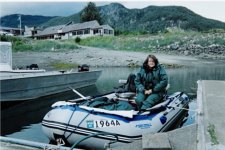marvin4239
New member
- Joined
- Feb 6, 2007
- Messages
- 1,165
- Reaction score
- 0
- C Dory Year
- 2007
- C Dory Model
- 22 Cruiser
- Hull Identification Number
- CDO2263Ok607
- Vessel Name
- C-FLE II
A 27 year old man apparently lost his life today while trying to refuel his outboard while underway in the Saint Johns. It appears he was leaning over the transom trying to pour fuel in his kicker while his wife was operating what appeared to be approximately a 30 ft sailboat. Details are not clear but the part of the river he went overboard in is maybe a mile and half wide. He wasn't wearing a life preserver. Search and rescue hasn't located the body yet. Just yesterday we had a 6 story parking garage that was under construction collapse in downtown Jacksonville. Things haven't been to pleasant around the River City lately.
By Jessica Clark
First Coast News
CLAY COUNTY, FL -- Authorities from several agencies are searching by water and by air for a missing boater on the St. Johns River.
The Clay County Sheriff's Office received a call for help from a woman in a sailboat. She told authorities her husband fell overboard while trying to fill up a gas can just after 9 a.m.
Authorities located her a few miles south of the Shands Bridge in the sailboat. Crews also recovered a gas can, but the 27-year-old man has not been found.
The couple is from Miami.
Search teams are staged near the Williams Park Road boat ramp.
Three helicopters are up in the air looking for the man.
Dive teams and boats from Jacksonville Fire & Rescue, the Coast Guard and the Florida Fish and Wildlife Conservation Commission (FWC) are also helping out.
The sheriff's office says the water is very dark.
First Coast News reporter Jessica Clark will have the very latest beginning at 5 p.m.
By Jessica Clark
First Coast News
CLAY COUNTY, FL -- Authorities from several agencies are searching by water and by air for a missing boater on the St. Johns River.
The Clay County Sheriff's Office received a call for help from a woman in a sailboat. She told authorities her husband fell overboard while trying to fill up a gas can just after 9 a.m.
Authorities located her a few miles south of the Shands Bridge in the sailboat. Crews also recovered a gas can, but the 27-year-old man has not been found.
The couple is from Miami.
Search teams are staged near the Williams Park Road boat ramp.
Three helicopters are up in the air looking for the man.
Dive teams and boats from Jacksonville Fire & Rescue, the Coast Guard and the Florida Fish and Wildlife Conservation Commission (FWC) are also helping out.
The sheriff's office says the water is very dark.
First Coast News reporter Jessica Clark will have the very latest beginning at 5 p.m.

